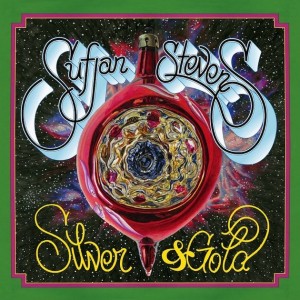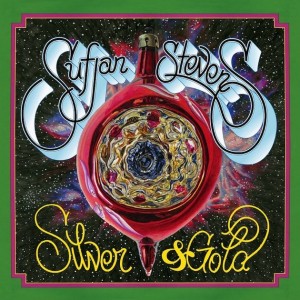Search for topics or resources
Enter your search below and hit enter or click the search icon.

Last week I attended a Sufjan Stevens concert in Hollywood at the Fonda Theater. It was Sufjan’s Christmas concert tour, celebrating the immense collection of Christmas music in Suf’s catalogue (most recently the just-released 5-disc set, Silver & Gold, which includes no less than 58 tracks exploring Christmas from just about every angle imaginable).
The sell-out concert was memorable, to say the least. The music was alternately nostalgic, warm, absurd, annoying, jolly, kitschy, campy, somber and sacred. Kind of like Christmas.
Sufjan has always been an artist that no one category could pin down. Is he a devout Christian? Is he the savior of folk? A banjo-wielding, sometimes techno-inclined performance artist? A truckerhat-wearing, oboe-playing Liberace for the more clean-cut Millennial hipster? Probably all of the above.
 Sufjan’s embrace of paradox manifests itself most importantly, I think, in the way that he very deliberately fuses kitsch, camp and irony with a disarming sincerity and insistence on meaning. In one moment he and his band--which included Rosie Thomas dressed as a chainsaw-wielding snowman--are spinning the giant “Wheel O’ Christmas” to determine which carol they will lead the audience in singing next. In the next minute he is leading his bandmates in the a capella singing--with four-part harmony--of old hymns like “Lift up your heads, ye mighty gates” or “Ah, Holy Jesus.”
Sufjan’s embrace of paradox manifests itself most importantly, I think, in the way that he very deliberately fuses kitsch, camp and irony with a disarming sincerity and insistence on meaning. In one moment he and his band--which included Rosie Thomas dressed as a chainsaw-wielding snowman--are spinning the giant “Wheel O’ Christmas” to determine which carol they will lead the audience in singing next. In the next minute he is leading his bandmates in the a capella singing--with four-part harmony--of old hymns like “Lift up your heads, ye mighty gates” or “Ah, Holy Jesus.”
Sufjan’s brand of camp embodies the sort of multi-level processing of meaning that Susan Sontag described in her famous essay, “Notes on Camp.”
“The Camp sensibility,” she wrote, “is one that is alive to a double sense in which some things can be taken … between the thing as meaning something, anything, and the thing as pure artifice.” It is any approach to reality that “sees everything in quotation marks.”
Sufjan’s Christmas work is case and point of what seems like his desire to explore a milieu that is at once the pinnacle of artifice and yet full of echoes of the most meaningful things of all.
Take “Christmas Unicorn,” the 12-minute, cuckoo conclusion to Silver & Gold. On stage, the performance of this insanely campy Christmas anthem includes confetti guns, huge beach balls, techno dance breaks, Sufjan himself wearing a homemade “Christmas Unicorn” backpack and helmet, and about 5 minutes of nothing but the repeated chant: “I'm the Christmas Unicorn! You're the Christmas Unicorn too!”
And yet beneath the glitter, foil costumes, synth, and quirky preciousness, the song tries to capture a kernel of truth about Christmas--namely that it has become something of a hot mess of commercialization, sentimentality and religio-cultural-fantastical pastiche.
The “Christmas Unicorn” declares:
Oh I'm a Christian holiday; I'm a symbol of original sin
I've a pagan tree and a magical wreath and bow-tie on my chin!
Oh I'm a pagan heresy; I'm a tragical Catholic shrine
I'm a little bit shy, with a lazy eye, and a penchant for sublime
Oh I'm a mystical apostasy; I'm a horse with a fantasy twist
Though I play all night with my magical kite, people say I don't exist
For I make no full apology; for the category I reside
I'm a mythical mess with a treasury chest; I'm a construct of your mind
Oh I'm hysterically American! I've a credit card on my wrist
And I have no home or a field to roam; I will curse you with my kiss
Oh I'm a criminal pathology with a history of medical care
I'm a frantic shopper and a brave pill-popper and they say my kind are rare...
Sure, the song is over-the-top and all over the place. But that’s Sufjan’s point. Christmas has become an all-over-the-place, overblown behemoth. Perhaps the best way to see through to the truth of the Incarnation is to recognize how obscured is the story of Christ by the absurdity of holiday excess. This is the method to Sufjan’s madness. He recognizes that in this day-and-age, to this generation--reared on Home Alone and Rudolf cartoons, Black Friday and Vince Guaraldi’s Charlie Brown Christmas--a sincere meditation on Christmas must be couched within (or at least primed by) a little festive irony, some healthy tongue-in-cheek excess.
 As an essay on Sufjan’s website articulates, perhaps Christmas music “agitates our aging heartstrings” because it merges something sacred (“the substance of things hoped for, the evidence of things not seen”) and profane (“the boundless Potential Energy inherent in this bastard holiday so fitfully exploited, adapted, and confounded with no regard for decency”). Perhaps Christmas music “does justice to a criminal world, marrying sacred and profane, bellowing obtuse prophecies of a Messiah in the very same blustery breath as a candy-coated TV-jingle advertising a string of lights and a slice of fruitcake.”
As an essay on Sufjan’s website articulates, perhaps Christmas music “agitates our aging heartstrings” because it merges something sacred (“the substance of things hoped for, the evidence of things not seen”) and profane (“the boundless Potential Energy inherent in this bastard holiday so fitfully exploited, adapted, and confounded with no regard for decency”). Perhaps Christmas music “does justice to a criminal world, marrying sacred and profane, bellowing obtuse prophecies of a Messiah in the very same blustery breath as a candy-coated TV-jingle advertising a string of lights and a slice of fruitcake.”
Sufjan can get away with leading the crowd in singing “O Holy Night” because he’s already established with his audience a knowing rapport: they are in on the “joke” of this Christmas kitsch thing, this “bastardization.” And so they can track with Sufjan when it appears he is bursting through the candy cane schlock to grasp at something resembling meaning--even transcendence. They are actually hungry for it.
I was struck by the crowd’s enthusiasm as we raised our voices--a ragtag band of Los Angeleno hipsters, secular and religious alike, requisite marijuana smell thick in the air--to sing of Jesus Christ: “Chains shall he break for the slave is our brother, and in his name all oppression shall cease.”
Or when the crowd resounded with the familiar, jubilant declaration: “Joy to the World! The Lord is come. Let earth receive her King!”
I was similarly floored by the heartfelt gusto with which the crowd sang “Come Thou Fount,” corporately declaring that “Jesus sought me when a stranger / Wandering from the fold of God.”
On Silver & Gold’s fifth disc, the holly jolly gymnastics of “Christmas Unicorn” are immediately preceded by the beautifully understated and somberly expectant “Justice Delivers Its Death,” in which Sufjan strums a guitar and softly sings of mortality, mammon, and an earnest longing for Christ to return and set things to rights:
Lord come with fire
Lord come with fire
everyone's wasting their time
storing up treasure in vain
trusting the pleasure it gives
here on Earth
You could hear a pin drop in the concert when Sufjan sang this song.
Likewise when he performed “John Wayne Gacy, Jr.,” a song about the serial killer that is also about our sinful nature; or “Casimir Pulaski Day,” a song about a friend with cancer that is also about the problem of evil; or “Vito’s Ordination Song,” a song about Pastor Vito Aiuto (who wrote an essay in the liner notes to Silver & Gold) that is also about the sovereignty of God.
The audience liked Sufjan’s more madcap moments--the dissonant beeps, buzzes, crashes and chaos that accompanied the zombie nuns, bloodthirsty snowmen and other holiday transgressions making music onstage.
But the audience loved it when Sufjan got serious. Sufjan himself seemed relieved when he played the “real songs,” as he called them. Camp can only go so far in reaching the soul. As Sontag notes, “Camp is art that proposes itself seriously, but cannot be taken altogether seriously because it is ‘too much.’”
My generation has a hunger for substantial, unironic explorations of meaning. The self-aware meta and button-pushing avant-garde is our postmodern context; fragmentation, pastiche, and Christmas Unicorns make sense to us. But one grows weary of it. It can be, as Sontag puts it, “too much.” Perhaps Sufjan recognizes this. He seems to believe that Truth is out there; that not everything need be put in “quotation marks”; that an old-fashioned belief in narrative still has a place at the table of art.
And yet Sufjan earns the right to be sincere about these things. Millenials won’t just listen to anyone singing old hymns and religious carols, inviting them to sing along at an indie rock show. Sufjan pays his ironic dues by packaging earnest, tender narratives in the wrapping paper of DIY whimsy, vintage/nostalgia and Brooklyn-approved indie pop art.
I suspect, however, that I am not the only one who wishes that Sufjan, having fully established himself as a respectably elusive artist with the utmost indie cred, would now move away from his quirkier, more button-pushing impulses (We get it! You’re a un-catagorizable!) and return to a place of simpler sincerity and beautiful storytelling (the days of Michigan, Illinois and Seven Swans). But Sufjan will be Sufjan. And Christmas will be Christmas. The categories and chaotic conglomerations of our world are complex. Songs and stories and movies and holiday rituals will never exhaust the vast mystery of this world, and perhaps it’s better that way.
Brett McCracken is a Los Angeles-based journalist. He is the author of Hipster Christianity (2010) and Gray Matters (2013), and has written for the Wall Street Journal, the Washington Post, CNN.com, the Princeton Theological Review, Mediascape, Books & Culture, Christianity Today, Relevant, IMAGE Journal, Q Ideas, and Conversantlife.com. A graduate of Wheaton College and UCLA, Brett currently works as managing editor for Biola Magazine and teaches at Biola University. Follow him on Twitter @brettmccracken.